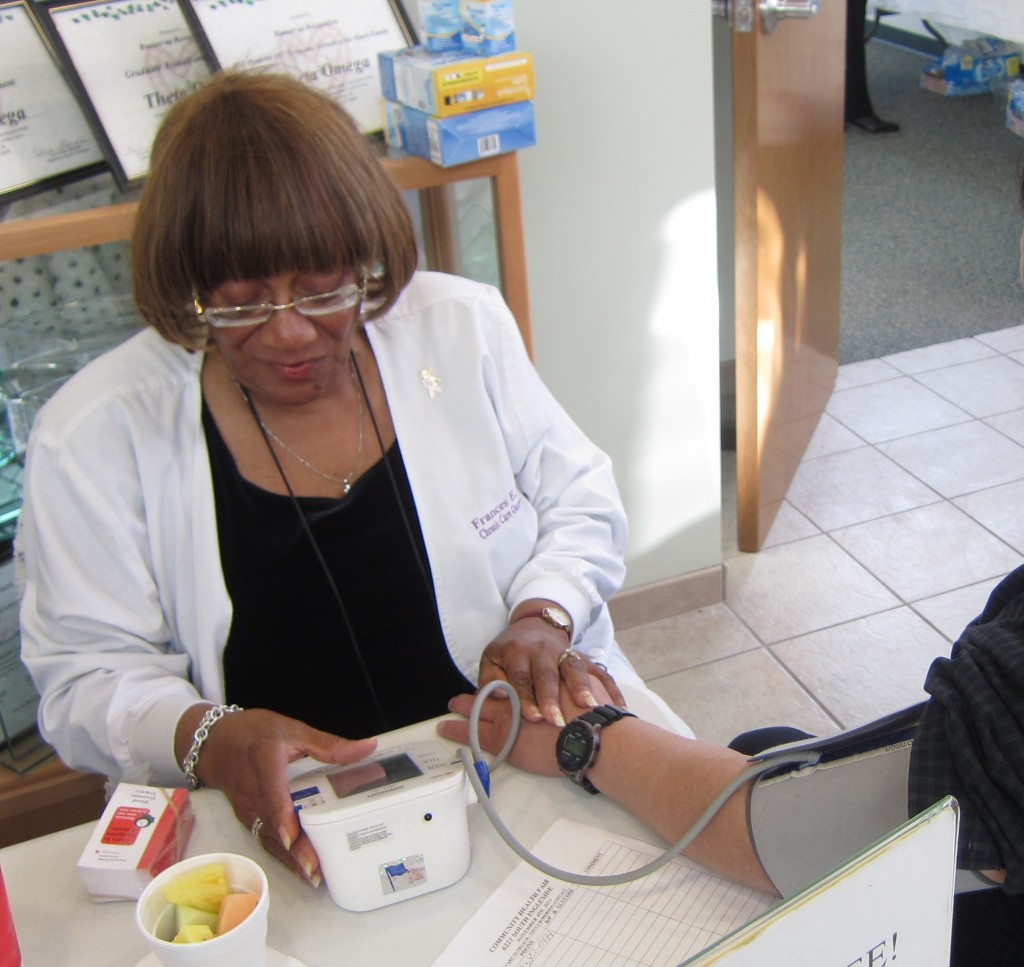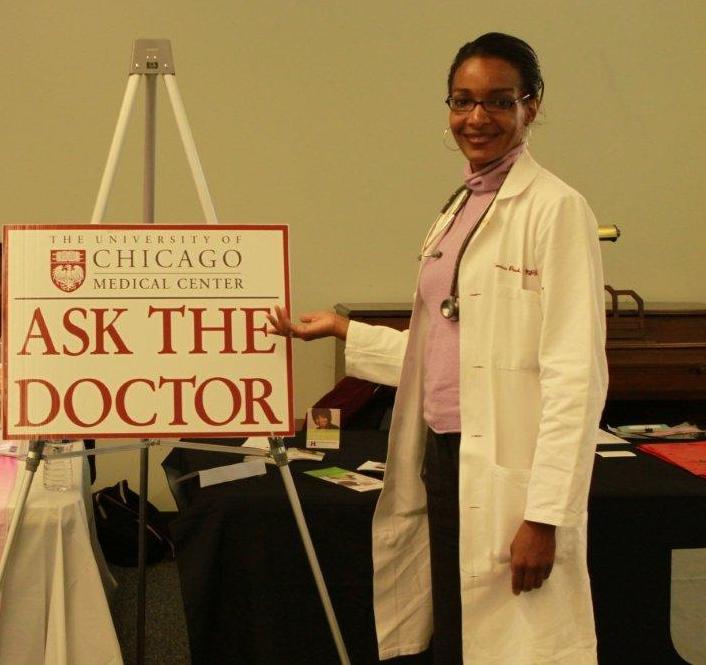Have you ever felt embarrassed to ask your doctor a question?
Ever left the doctor?s office confused?
When you make an appointment to see your doctor, whether if it?s for a routine check-up or for a new health issue, there is more to do than just calling the office to schedule the appointment and showing up on time.
 You need to be proactive in your care!
You need to be proactive in your care!
Shared Decision-Making is a very useful process that should be used every time a patient sees a doctor or other healthcare professional. Shared Decision-Making means what it sounds like?you share with your doctor in the process of making decisions about your health.
This means you should be proactive when it comes to your health care:
- know your treatment options
- express your preferences
- help decide which treatment plan is best for you
How can you do this?
It?s just three steps?the THREE Ds:
DISCUSS
Come prepared with a list of health concerns and discuss them with your doctor. Ask questions to make sure you understand your health problems?the doctor?s job is to make sure you have all the information you need! Make sure your doctor reviews all of your test results and gives you updates about your health and how you are doing. Be honest with your doctor?help them help you! They can only treat problems that they know about, and can only take the best care of you if they have all of the information (like whether or not you are really taking your diabetes medication).
 Remember that there is no such thing as a stupid question. Your healthcare team is there to answer all of your questions and to make sure you have as much information as possible. Often times, doctors sound like they are speaking another language?because they are! Sometimes healthcare professionals use medical terms that are confusing to patients because they forget that they are talking ?doctor speak?. It?s okay to ask them to explain things again in a way that you can understand.
Remember that there is no such thing as a stupid question. Your healthcare team is there to answer all of your questions and to make sure you have as much information as possible. Often times, doctors sound like they are speaking another language?because they are! Sometimes healthcare professionals use medical terms that are confusing to patients because they forget that they are talking ?doctor speak?. It?s okay to ask them to explain things again in a way that you can understand.

DEBATE
Many times there are several equally good ways to tackle a health problem, and it?s your job as a patient to know all of your options. When your doctor or healthcare professional recommends a test or treatment, make sure to let them know you?d like to hear about all possible options, and the pros and cons (or ?benefits and risks?) of each one. Have a friendly conversation with your doctor about all the options, and make sure to tell them your thoughts, feelings and preferences about the options available to you.
Your doctor can?t read your mind! Help them help you by letting your healthcare team know about things in your life that may affect choices about a treatment plan. For example, if you have a job that requires travel out of town every week, then a treatment that involves weekly appointments at the hospital may not be preferable if there is an alternative treatment that can be done all at once.

DECIDE
Be apart of the final decision of what will be best for YOU! The doctor is the expert in medicine, and you are the expert in being you and knowing your body.ÿ Together, you can find a treatment plan that is best for you.
Once you and your healthcare professional have decided on a plan, your job as a patient is not yet done. You have to make sure you understand all of the things you?re supposed to do once you leave the doctor?s office (e.g. how often to take the medication, where to go for the CT scan) and feel confident that you have the resources to put the plan into action. Think about the things you may need (e.g. additional information, home support) and your doctor may be able to identify people (such as a diabetes educator, social worker, or nurse) who can help you succeed with your treatment plan.
Remember that your healthcare team is there for YOU. They want you to succeed and be healthy. By taking an active part in your health care, you can help them help you be the best that you can.

Follow these tips to make it easier to DISCUSS, DEBATE, and DECIDE:
- Choose a doctor that you like and trust. Having a good relationship with your doctor means that you?ll feel more comfortable being honest and talking with them about your problems and letting them know your preferences for treatment.
- If possible, make an early appointment early in the day. Doctors are busy and often run behind! They are less rushed at the beginning of the day, and more able to take the extra time you need to talk about your health.
- Bring family member or friend with you. It?s always helpful to have an extra set of eyes and ears at your doctor visit. Your ?back-up team? can help remember questions you want to ask or issues you want to address. They can also help you remember what happened at the clinic visit once you get home. If you can?t bring anyone with you, it?s okay to have them contact the doctor later to discuss your medical problems (make sure that you?ve signed a form authorizing your healthcare team to talk to family and friends in your absence).
- Ask questions. Questions are the answer!ÿ Only by asking questions can you make sure that you understand everything that you need to about your health.
- Bring a list of all of your questions and concerns. This includes symptoms you are having, side effects from medications, general questions about your health, and anything else you want to discuss with your doctor. It?s easy to forget things once you?re sitting in the doctor?s office. Make a list of things you want to discuss and show them to your doctor at the beginning of the visit. This will help you both prioritize how to spend your time during the visit. It also helps you not to forget anything that you want addressed!

- Make sure that you understand the answers before you leave the office. It?s common to be embarrassed if we don?t understand what the doctor said and not to ask for clarification. However, remember that your doctor wants you to understand the answers, so ask them to explain it again using ?plain language?.
- Know your family history. And share this information with your doctor. You may be at increased risk for health problems (such as heart disease or cancer) if it runs in your family. Having this information will help your doctor take better care of you.
- Take a copy of the information home with you. Ask your doctor to print a copy of your test results or other health information. Keep in on file for future reference, to share with your family, and to share with other healthcare providers.
- Be sure to follow up with your doctor! Just because you are feeling better, doesn?t mean you don?t need to back to the doctor. Having diabetes is a chronic condition that requires regular check-ups and maintenance. You should see your doctor for routine visits at least twice a year.

Plan ahead
Come prepared
Communicate all your concerns
You will lower your stress and
make your visit more productive, both for you and your doctor
ÿ
For more info:
- Check out our award winning film, for examples of good and not-so-good shared decision-making!
- Check out the 10 Questions You Should Know, from the Agency for Healthcare Research and Quality
- More on ?Questions are the Answer,? from the Agency for Healthcare Research and Quality
